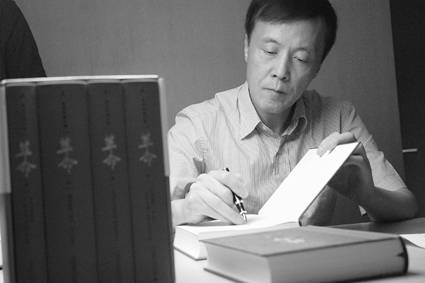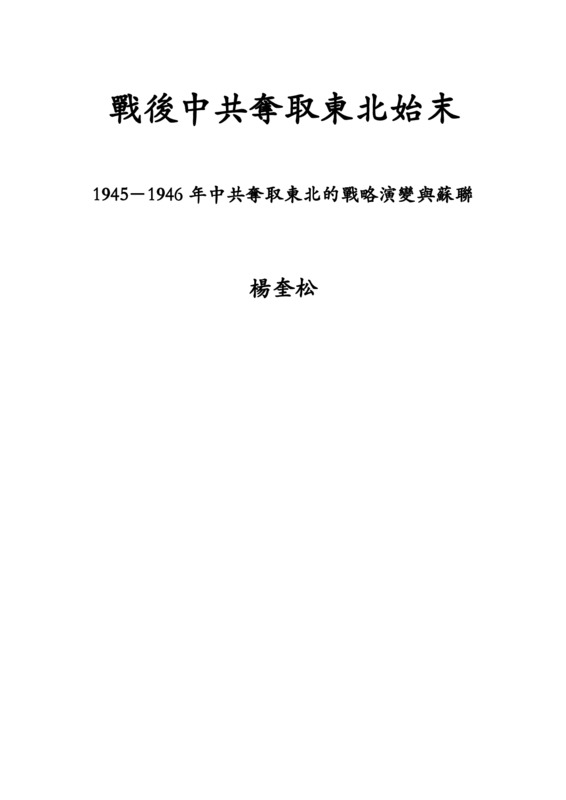Explore the collection
Showing 8 items in the collection
8 items
Book
1966: Memories of Our Generation
This book is a collection of nineteen feature articles by well-known contemporary scholars, researchers, and writers. They recapitulate their own experiences during the Cultural Revolution in a literary style.
When the Cultural Revolution broke out, they were all young people in their twenties. These reminiscence articles are the result of a rare collective reflection after the end of the Cultural Revolution. The authors described their own experiences during the Cultural Revolution in the articles, providing a personal perspective on history.
The chief editor of this book is the philosopher and activist Xu Youyu, a former researcher at the Institute of Philosophy, Chinese Academy of Social Sciences. Xu signed and made suggestions on Charter 08, and also is a co-founder of the New Citizens Movement. Since 2015 he has resided in New York City, where he has been a visiting scholar at the New School for Social Research.
This book was published by China Federation of Literary and Art Circles Publishing Corporation in 1998.
Book
Rebellion in All Its Shapes and Colors --The Formation and Evolution of the Spiritual Qualities of the Red Guards
This book seeks to reveal the characteristics of the Red Guard movement through the study of the Red Guard's spiritual qualities, such as the mode of action of the rebellion, the formation of factions and regional differences, as well as the types of Red Guard ideology and the trend of change before and after the Cultural Revolution, etc. The author is a peer of the Red Guard and has accumulated first-hand information on the subject through extensive interviews and documentary research. The author of this book, Xu Youyu, is a peer of the Red Guards, and has accumulated first-hand information about the research through a large number of interviews and documentary research. At present, there are very few studies that analyze the formation of the Red Guards' mentality based on oral data and case studies. Therefore, this book is of great reference value to researchers in this field. This book was published by the Chinese University of Hong Kong Press in 1999.
Film and Video
Working toward a Civil Society (Episode 8): Xu Youyu
How can China build a true civil society? Since 2010, independent director Tiger Temple has conducted a series of interviews with scholars and civil society participants.
Article
Yang Kuisong: A Study of New China's "Counter-Revolutionary Suppression" Campaign
How many people were "killed," "imprisoned," and "controlled" in the whole "anti-revolution" campaign? Mao Zedong later said that 700,000 people were killed, 1.2 million were imprisoned, and 1.2 million were put under control. Mao's statement was naturally based on a report made in January 1954 by Xu Zirong, deputy minister of public security. Xu reported at the time that since the anti-revolution campaign, the country had arrested more than 262,000, of which "more than 712,000 counter-revolutionaries were killed, more than 12,900,000 were imprisoned, and 1,200,000 were put under control, and more than 380,000 were released through education because their crimes were not considered serious after their arrest." (3) Taking the figure of 712,000 executed, it already amounts to one and two-fourths thousandths of one percent of the country's 500 million people at that time. This figure is obviously much higher than the one-thousandth of a percent level originally envisioned by Mao Zedong.
Article
Yang Kuisong: The Beginning and End of the CCP's Seizure of the Northeast after the War
The occupation of the Northeast was key to the CCP's success in seizing power in 1949. The author of this book, Yang Kuisong, is a professor and doctoral director of the Department of History at East China Normal University, and a researcher at the Institute of Modern History at the Chinese Academy of Social Sciences. This book describes the CCP's taking of the Northeast as well as the competition between the U.S. and the Soviet Union at that time. After reading it, you will understand: how the Soviet Union played a key role in the CCP's occupation of the Northeast.
Article
China Labour Bulletin Report Series on Labor Rights Protection in China
On June 12, 2025, the Hong Kong–based NGO China Labour Bulletin (CLB) announced its dissolution. This marks yet another Chinese civil society organization that ceased operations following the implementation of the Hong Kong National Security Law. Founded in 1994, CLB was dedicated to promoting the Chinese labor movement and had long focused on labor rights in China. Headquartered in Hong Kong, its founder Han Dongfang was a workers’ leader during the 1989 Tiananmen Democracy Movement and one of the founders of the Beijing Workers’ Autonomous Federation.
Over the years, China Labour Bulletin published dozens of reports in Chinese and English on China’s labor movement, addressing issues related to migrant workers, food delivery couriers, women workers, child labor, coal mining, and pneumoconiosis, among others. Following the organization’s dissolution, the China Labour Bulletin website was also taken offline.
In response, the China Unofficial Archives website immediately downloaded and preserved 80 Chinese- and English-language reports from the site. The following 26 reports are studies on the labor rights protection in China published between 2004 and 2024, including titles such as “Research Report on China’s Food Delivery Industry,” “Labor Rights in the Construction Industry,” “Healthcare Workers’ Rights Report,” and “Workers’ Rights in the Manufacturing Sector,” among others.
Article
China Labour Bulletin Report Series on Workers' Movement
On June 12, 2025, the Hong Kong–based NGO China Labour Bulletin (CLB) announced its dissolution. This marks yet another Chinese civil society organization that ceased operations following the implementation of the Hong Kong National Security Law. Founded in 1994, CLB was dedicated to promoting the Chinese labor movement and had long focused on labor rights in China. Headquartered in Hong Kong, its founder Han Dongfang was a workers’ leader during the 1989 Tiananmen Democracy Movement and one of the founders of the Beijing Workers’ Autonomous Federation.
Over the years, China Labour Bulletin published dozens of reports in Chinese and English on China’s labor movement, addressing issues related to migrant workers, food delivery couriers, women workers, child labor, coal mining, and pneumoconiosis, among others. Following the organization’s dissolution, the China Labour Bulletin website was also taken offline.
In response, the China Unofficial Archives website immediately downloaded and preserved 80 Chinese- and English-language reports from the site. The following 15 reports are observation reports on China's workers' movement.
文章
China Labour Bulletin Report Series on Trade Union Reform
On June 12, 2025, the Hong Kong–based NGO China Labour Bulletin (CLB) announced its dissolution. This marks yet another Chinese civil society organization that ceased operations following the implementation of the Hong Kong National Security Law. Founded in 1994, CLB was dedicated to promoting the Chinese labor movement and had long focused on labor rights in China. Headquartered in Hong Kong, its founder Han Dongfang was a workers’ leader during the 1989 Tiananmen Democracy Movement and one of the founders of the Beijing Workers’ Autonomous Federation.
Over the years, China Labour Bulletin published dozens of reports in Chinese and English on China’s labor movement, addressing issues related to migrant workers, food delivery couriers, women workers, child labor, coal mining, and pneumoconiosis, among others. Following the organization’s dissolution, the China Labour Bulletin website was also taken offline.
In response, the China Unofficial Archives website immediately downloaded and preserved 80 Chinese- and English-language reports from the site. The following 18 reports are studies concerning trade union reform in China.





